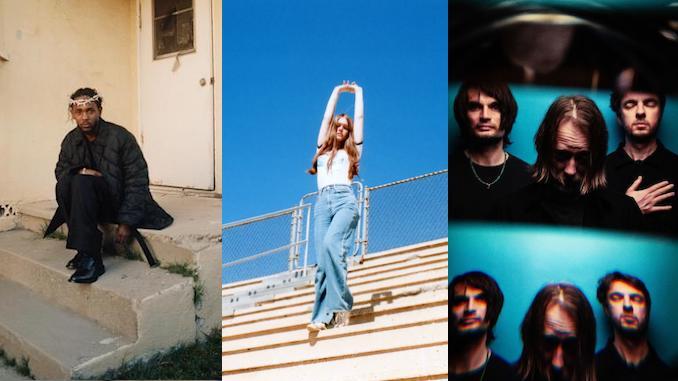Summer is heating up and 2022’s halfway point is right around the corner, but let’s not get ahead of ourselves: The month of May was rife with major releases, from Kendrick Lamar’s much-anticipated return to the debuts of rising Southern gothic pop star Ethel Cain and Radiohead/Sons of Kemet supergroup The Smile. Those are just a couple of the records the Paste Music team slotted into this month’s top 10. Read up on—and listen to—the 10 best albums of May below.
Listen to our Best Albums of May 2022 playlist on Spotify here.
Ethel Cain: Preacher’s Daughter
Between last year’s monster EP Inbred and a slated performance at Pitchfork Music Festival, Ethel Cain is on a brilliant ascent. Inbred solidified her position as a force to be witnessed in American music as she wrestled with the uniquely Southern version of the American dream that shaped her young life. The divinity of gospel, the audacity of heartland rock and the frankness of 2010s Tumblr-era pop collide into an arresting narrative spectacle, portraying the experience of a woman who is intimately familiar with depraved violence, the gospel and the strict social hierarchies of the South and the Plains. The EPs have only revealed a portion of Cain’s lore, but on her whopping 75-minute debut LP Preacher’s Daughter, Ethel Cain, the narrative figure and the musical sensation, manifests a breathtaking account of a woman, her mysterious partner and her troubled family. Much as Inbred mangled Americana, ambient folk and slowcore into a terrifying sonic experiment, Preacher’s Daughter is a sound all its own. Imagine what would happen if singers as familiar as Bruce Springsteen or Nichole Nordeman were backed by Midwife or Sunn O))). The glamorous and aphrodisiac sound of Lana Del Rey is undoubtedly there, but the thematic and instrumental elements on Preacher’s Daughter possess a weightiness and impulse away from ironic glamorization of the American dream and toward outright criticism that render the comparison only so relevant. At times the record throbs with a noisy, immersive intensity before transitioning into the kind of epic guitar solos that decorated the cult of rock personalities in generations past. This collision of dark ambient and Def Leppard is uniquely American in the best way conceivable. —Devon Chodzin
Just Mustard: Heart Under
Irish quintet Just Mustard’s debut album, 2018’s Wednesday, often got labeled as shoegaze, but the band’s jarring, hollowed-out production suggested they had harsher, noisier tricks up their sleeve. For every pairing of distortion-infused guitars and breathy vocals—a mix strong enough to earn the band opening slots with The Cure—there was something more viscerally horrendous around the corner. Wednesday opened with what sounded like an entire factory’s gears grinding as if about to explode, and that mechanical noise remained at the album’s outskirts, like a rusty train rattling past a small town. Atop all this commotion, frontperson Katie Ball explored dark images too vague to read as autobiography, yet too twisted to pass as autofiction. On Heart Under, Just Mustard’s sophomore album, the noise at Wednesday’s periphery becomes the center of attention, and Ball reaches further into her whispery high register as she gestures at nightmares and horrors without clearly painting them. She doesn’t need to be direct in her lyrics—her haunting sneer carries enough tension to mount a curtain rod, and her band’s guitars now sound less like stringed instruments than crazed wild animals crying for help and electric grids sputtering out violently. To call this sound “shoegaze” would grossly understate the innovation, intensity and sheer brutality of the music. Heart Under is simultaneously ghostly and glorious, a wretched yet emancipatory tornado of distorted dissonance that places the band among the vanguard of the British Isles’ ever-crowded post-punk scene. —Max Freedman
Kendrick Lamar: Mr. Morale & The Big Steppers
Throughout Mr. Morale & The Big Steppers, Kendrick Lamar unpacks his sins. His longtime partner Whitney Alford urges him to seek counseling after his various infidelities are revealed. Kendrick, now the father of two children, is told to turn to Oprah-approved German philosopher Eckhart Tolle to get to the root of what would cause his supposed sex addiction. The production on the album mirrors Kendrick’s distress. Gone are the pleasant jazz compositions of To Pimp a Butterfly and the cleaner rhythms of DAMN.—in their place are scattered piano lines, manic drums, distorted vocal samples and panic attack-inducing synths, all designed to give the listener feelings of anxiety and discomfort. The album plays out like an open therapy session, filled with the raw and unfiltered thoughts of one of the greatest rappers to ever pick up the mic. These thoughts are vulnerable, unmanicured and, to the shock of some fans, politically incorrect and ignorant. Mr. Morale & The Big Steppers rejects conformity and leaves its flaws in on purpose, featuring some of Kendrick’s best and worst songs of his career. —Josh Svetz
Leikeli47: Shape Up
Brooklyn rapper Leikeli47 is a shapeshifter. Her attitude-laden raps hold endless amounts of confidence and wit. Her new album Shape Up, her first full-length project since 2018’s Acrylic, is bursting at the seams with charm. Chopped-up vocals become second instruments, and Leikeli’s expressive delivery props her up as a beacon of resilience. Whether over bubblegum-bright dance beats or bass-heavy grime, Leikeli continues to build her artistry on her own terms under the veil of anonymity, with a fierce love for Black womanhood and the power of dance. —Jade Gomez
Maria BC: Hyaline
“Hyaline,” the title of Oakland-based ambient-folk artist Maria BC’s debut album, is defined as describing “a thing that is clear and translucent like glass, especially a smooth sea or a clear sky.” It’s the perfect title—Hyaline itself is hyaline, an array of sparsely populated soundscapes that gives listeners the choice to either study its minute details and subtle fluctuations in texture, or peer right through and see the world anew. Maria BC’s luminous vocals—they are a classically trained mezzo-soprano—glide through close-mic’d slowcore guitars, atmospheric synths and purposeful (read: rare) percussion, burning and flickering like a candle in the dark. The artist’s voice intertwines with guitar arpeggios, piano and itself on the mesmerizing “April,” while on standout “Betelgeuse,” synth and string shapes appear, then dissolve, like clouds in Maria BC’s sky. All you have to do is lay down and look up. —Scott Russell
Porridge Radio: Waterslide, Diving Board, Ladder to the Sky
For Brighton four-piece Porridge Radio, the fate of their sophomore album, Every Bad, was uncertain upon release. Just look at its March 13, 2020, street date and it’s obvious why one would worry about it being lost amidst the social upheaval. Fortunately, Every Bad was an album remarkable enough to break through the noise with some noise of its own: It established Porridge Radio as a deeply gifted band on the come-up. Led by Dana Margolin and composed of Georgie Stott, Sam Yardley and Maddie Ryall, they went from making a soft, subtle Bandcamp indie to building massive, vociferous slacker-rock songs. Their music is frenetic and unpredictable, melodic despite its cacophonous arrangements. Margolin’s voice, dark and powerful, is more often than not being pushed to the edges of its range, strained as though she’s trying to get every last drop of emotion out of each word she screams. As the record played and each song ended with growing chaos and incendiary performances, one could only speculate what power the next track would hold. It’s fair to wonder the same about a follow-up. When you come out swinging like Porridge Radio had, how long before you run out of steam? Waterslide, Diving Board, Ladder to the Sky, the band’s third album, sees them sidestep the trap that question contains. Waterslide is a masterpiece, finding Porridge Radio, and Margolin especially, in an elevated state. They’re eager to embrace uncertainty, leveling up in every regard, sacrificing none of the intensity that made them stand out. —Eric Bennett
Quelle Chris: DEATHFAME
Quelle Chris is not interested in fitting into any conventions, and DEATHFAME might be his most innovative album yet. The gentle, preacher-like cadence of “Alive Ain’t Always Living” and the soul of “The Sky Is Blue Because The Sunset Is Red” only represent a fraction of the sounds Quelle explores. Pitched-down vocals and mysterious clangs seep into ominous samples, evoking the urban legends of Memphis rap sigils and the murkiness of nihilism. Quelle swan-dives into a beautiful death, taking listeners along for the ride in the twisted, Willy Wonka-like abyss he finds on the way down. —Jade Gomez
Sharon Van Etten: We’ve Been Going About This All Wrong
Praising Sharon Van Etten for making “intensely personal” albums is looking at things the wrong way around. Any artist can do that. What sets Van Etten apart is her ability to make albums that feel intensely personal for her listeners—as if she’s giving voice to your inner life, rather than her own. Her sixth album is a loose song cycle that encompasses how it feels to balance work, motherhood and intimacy in a time of roiling uncertainty. That’s a lot to take on, but she nails it: The 10 songs on We’ve Been Going About This All Wrong land hard and, like her best work, take on the meanings her listeners need. Like Remind Me Tomorrow, there’s a wide array of sounds here, from pastoral tunes built around acoustic guitar to synth-heavy jams that clank and snarl like some infernal machine. The difference is that Van Etten has a tighter rein on these songs, giving them a feeling of wildness barely held in check. —Eric R. Danton
The Smile: A Light For Attracting Attention
During the first year of the pandemic, as Radiohead seemingly shifted from active band to archival project, Thom Yorke and Jonny Greenwood did something they haven’t done since their teenage years: They formed a new band together. They called it The Smile—a reference to a Ted Hughes poem, not their sunny dispositions, in case there was any confusion—and they invited Tom Skinner, drummer for the British jazz group Sons of Kemet, to fill the intimidating position of the sole non-Radiohead member of the trio. Nearly half the time, A Light for Attracting Attention buzzes and crackles with a sense of reckless abandon absent from the last 15 years’ worth of Radiohead releases. “You Will Never Work in Television Again” has the high-octane guitars and mile-a-minute Yorke delivery to boost a dead person’s heart rate. It’s a revelation. “Thin Thing” is menacing and wonky, with a burbling guitar riff that seems maximized to confuse those YouTube guitar tutorial guys. These songs are insular and anxiety-ridden, shorn of soaring choruses or straightforward rhythms, but they are also invigorating jolts of art-rock energy. Like much of this album, the emphasis is on proggy interplay over studio trickery. But this is hardly a barebones garage-rock diversion. The Smile contain multitudes. No Radiohead side project has ever sounded quite as much like Radiohead as this band does, invoking many eras of the band’s career at once. I assume I Can’t Believe It’s Not Radiohead! was a rejected album title. —Zach Schonfeld
They Hate Change: Finally, New
New Jagjaguwar signees They Hate Change are all over the place, and that is far from a bad thing in this case. Their label debut Finally, New expands upon the jittery futurism that places the production/rap duo on the margins of hip-hop, pop and electronic music. Going pedal to the metal on Finally, New is their only option, testing how far they can go in creating genre-bending experiences that draw upon a palette refined through the millennial urge to hoard music on the internet. —Jade Gomez
Listen to our Best Albums of May 2022 playlist on Spotify here.




